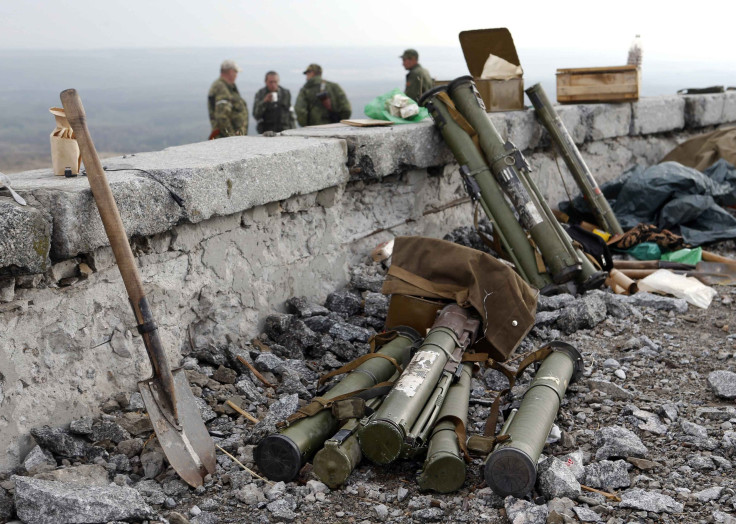Russian 'Invasion' Breaks Budapest Memorandum, May Prompt NATO Action

Ukrainian President Petro Poroshenko and NATO both contend that Russian troops have crossed the border into Ukraine, which could prompt severe sanctions from Europe and the U.S. and possible NATO military action, say foreign policy experts. By launching what effectively amounts to an invasion, Russia may be in breach of an important international agreement protecting Ukraine's territorial integrity, which it signed with the U.S. and the U.K. 20 years ago.
“NATO needs to respond forcefully,” said Stephen J. Blank, senior fellow at the American Foreign Policy Council and former professor at the U.S. Army War College. “I would even recommend sending troops to Ukraine under the Budapest Memorandum and under the relevant NATO article. This is the biggest security threat in the world right now, much greater than ISIS, frankly.”
The Budapest Memorandum is an agreement signed in 1994 that protected Ukrainian sovereignty, provided the country handed over to Russia what nuclear weapons it had in the wake of the Soviet Union’s collapse. The agreement was first breached when pro-Russian separatists took control of Crimea earlier this year, but Russia denied that it had anything to do with the takeover -- even though it annexed the peninsula immediately. This time, NATO satellite evidence shows Russian armor crossing the border into Ukraine, which brings the memorandum into question once more.
The agreement states that the signatory countries of Russia, U.S. and U.K. “reaffirm their obligation to refrain from the threat or use of force against the territorial integrity or political independence of Ukraine” and that no weapons should be used against the country unless “otherwise in accordance with the Charter of the United Nations.”
Blank believes that the agreement has been broken, and NATO members can act under Article Four of the alliance's charter, because Russian action threatens “the security of every NATO member in Europe,” he said. Unlike Article Five, which is a “one-for-all and all-for-one” provision that automatically triggers NATO action should one member be attacked, Article Four states that "The Parties [NATO members] will consult together whenever, in the opinion of any of them, the territorial integrity, political independence or security of any of the Parties is threatened."
Ukraine is not a member of NATO, but Poland, Slovakia, Hungary and Romania, which all border on it, are.
NATO has been slow to respond to the new developments in Ukraine, says one expert. “Over the last two days there has been no direct or significant response to what Russia is doing,” said Ariel Cohen, principal of International Market Analysis, Ltd. and a director at the Institute for the Analysis of Global Security, who was speaking from Kiev. “But what’s telling is how they’ve responded in other less direct ways.”
Non-members Sweden and Finland, for example, signed an agreement with NATO on Wednesday to cooperate if "disasters, disruptions and threats to security" emerge. The development is significant as Sweden and Finland are both officially neutral nations, not signatories of the treaty that created NATO. In addition, NATO has deployed forces to new bases that border Russia, including fighter aircraft to patrol the skies over member states Estonia, Latvia and Lithuania, and will meet next Thursday to discuss the developments in eastern Ukraine.
“The breaking of the memorandum,” Cohen said, “could very well be the tipping point for more severe sanctions including a fourth and fifth round, like banning Russia from SWIFT, similar to the way Iran was banned.”
Excluding a country from SWIFT, an interbank transfer service, is normally referred to as the “nuclear option” of sanctions because it literally bans all monetary transactions from and to the country in question. It would mean Russia would be unable to pay for imports or receive payment for oil and gas.
According to Blank, more immediate action is required. “They need to respond even before NATO meets next week in Cardiff,” Wales, he said. “They need to send weapons and training to Ukraine and increase the amount of financial support to stabilize the economy to keep it going.”
© Copyright IBTimes 2024. All rights reserved.






















